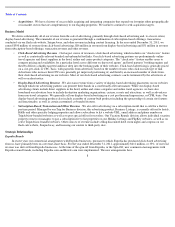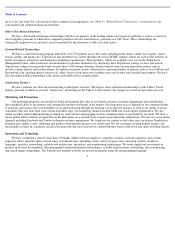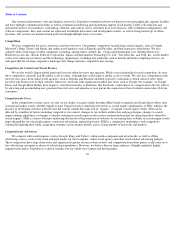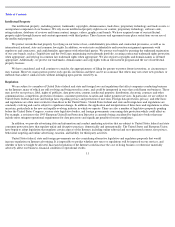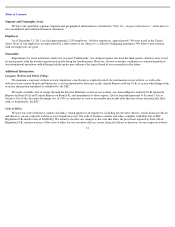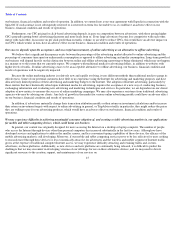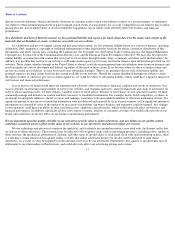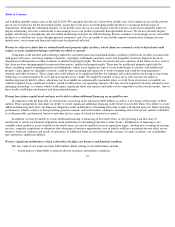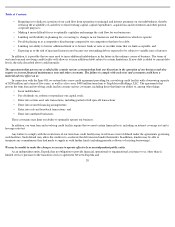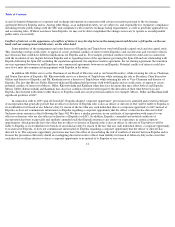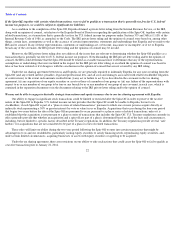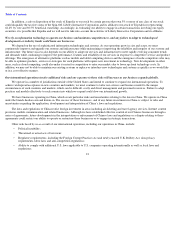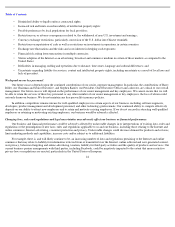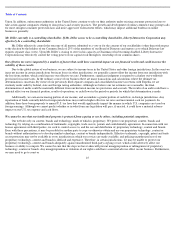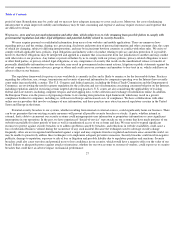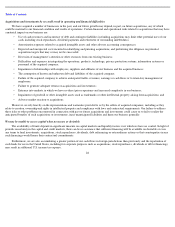TripAdvisor 2011 Annual Report Download - page 22
Download and view the complete annual report
Please find page 22 of the 2011 TripAdvisor annual report below. You can navigate through the pages in the report by either clicking on the pages listed below, or by using the keyword search tool below to find specific information within the annual report.
Table of Contents
New technologies could block our ads, which would harm our business.
Technologies have been developed that can block the display of online ads and that provide tools to users to opt out of some web-based
advertising products. We derive most of our revenues from fees paid to us by advertisers in connection with the display of ads on web pages for
our users. As a result, these technologies and tools could adversely affect our business and financial performance.
Unfavorable media coverage could negatively affect our business.
We receive significant media coverage in our various geographic markets. Unfavorable publicity regarding, for example, our privacy
practices, product changes, the accuracy of user-generated content, product quality, litigation or regulatory activity could adversely affect our
reputation with our site users and our advertisers. Such negative publicity also could have an adverse effect on the size, engagement, and loyalty
of our user base and result in decreased revenue, which could adversely affect our business and financial results.
If we do not continue to innovate and provide tools and services that are useful to travelers, we may not remain competitive, and our business
and financial performance could suffer.
Our success depends in part on continued innovation to provide features and services that make our websites and mobile and tablet
computing applications useful for travelers. Our competitors are continually developing innovations in online travel-related services and
features. If we are unable to provide quality features and services that travelers want to use, then travelers may become dissatisfied and use a
competitor’s offerings. If we are unable to continue offering innovative products and services, we may be unable to attract additional users,
which could adversely affect our business and financial performance.
Our culture emphasizes rapid innovation and prioritizes user engagement over short-term financial results.
We have a culture that encourages employees to quickly develop and release new and improved products, which may at times result in
unintended consequences or decisions that are poorly received by users or advertisers. Our culture also prioritizes user engagement, or website
“stickiness,” over short-term financial results. We have taken actions in the past and may continue to make product decisions going forward that
have the effect of reducing our short-term revenue or profitability if we believe that the decisions benefit the aggregate user experience and will
thereby improve our financial performance over the long-term. These decisions may not produce the long-term benefits that we expect, in which
case our user growth and engagement, our relationships with users and advertisers, and our business and results of operations could be harmed.
We may not be able to successfully expand into the vacation rental marketplace.
We offer vacation rental services through our U.S.-based FlipKey and U.K.-based HolidayLettings businesses, as well through various
partnerships. The online vacation rental market is relatively new and is rapidly evolving, and limited data is currently available regarding the
market and industry. Our vacation rental services may not succeed, and, even if successful, our revenues may not increase. These new services
could also increase our operating costs. Furthermore, a larger competitor exists in the vacation rental space, with significantly more users and
listed properties, and new competitors with significant financial resources are continually emerging. If property owners and managers do not
perceive the benefits of marketing their properties online or marketing their properties with several intermediaries, then the market for our
services may not develop as expected, or it may develop more slowly than expected, either of which would slow the growth of our business and
revenues.
Growth in use of TripAdvisor through our mobile products as a substitute for use on personal computers may negatively affect our revenue
and financial results.
Approximately 13 million downloads of our mobile applications have occurred as of December 31, 2011 and we estimate an average of
16 million monthly unique users on mobile devices, up from 2 million downloads
18


